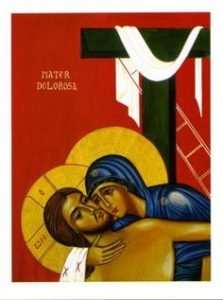 The fullness of humanity in Christ is also further defined in the theological synthesis of Maximus the Confessor and his doctrine of the “two wills”. It was affirmed during the period of iconoclasm when it was maintained the Christ could be depicted because He was truly a human.
The fullness of humanity in Christ is also further defined in the theological synthesis of Maximus the Confessor and his doctrine of the “two wills”. It was affirmed during the period of iconoclasm when it was maintained the Christ could be depicted because He was truly a human.
In 431 the Council of Ephesus, which marked the first and decisive victory of Cyrillian Christology over Nestorianism, expressed itself in a single doctrinal decision: the Mother of Jesus is to be properly designated in the prayers of the Church, in preaching and in theological dissertations as “Bearer of God” (Theotokos), or “Mother Of God” (meter theou). The decision was concerned with Christology: it affirmed the personal identity of Christ as the preexisting and eternal son of God assuming human nature (not simply a single human individual). Since a mother is necessarily the mother of somebody (not of just a ”nature”) and since this “somebody” in Christ was God, her proper identity was indeed “Mother of God.” (All should be aware that many Christians who are not of the Catholic or Orthodox Churches do not accept her as the “Mother of God”). I am sure that my readers can see the profound logic that informed the thinking of the fathers of the Council of Ephesus.
It was inevitable that the Christological decision of Ephesus would also add a decisive new emphasis to Christian spirituality: a renewed veneration of Mary – the woman through whom the incarnation occurred; the one human person who, by free concurrence with the greatest act of God’s love, made the union of divinity and humanity possible.
It should be pointed out that WE DO NOT WORSHIP Mary. The Church “venerates” her and has devotion to her but we reserve adoration to the incarnate Word and equally to the Father and the Holy Spirit. We worship only the Holy Trinity.
The liturgical feasts dedicated to the Mother of God and Marian devotions such as Moleben, show her honor for her role in the incarnation of our God in the Person of Jesus, the Christ. Catholic and Orthodox Christians often get accused of worshipping Mary, making her equal to God. This is not true. We hold her in the highest esteem and see her as a model of a person who freely did the will of God. Truly a person we should attempt to imitate.
